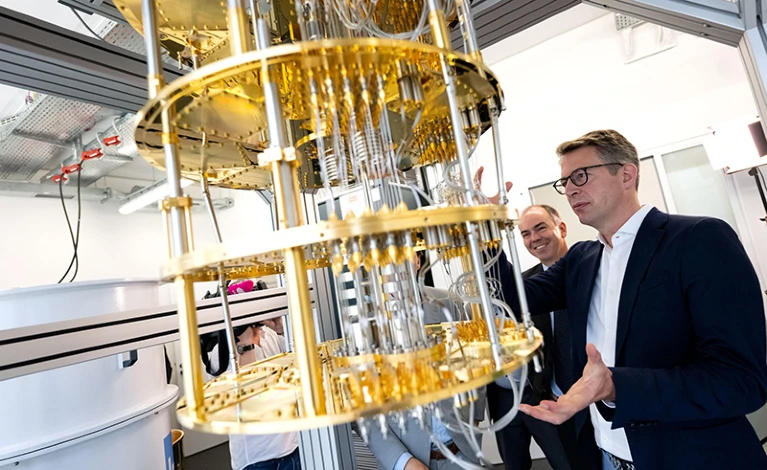by MICHAEL BROOKS

For now, absolutely nothing. But researchers and firms are optimistic about the applications.
Most researchers have never seen a quantum computer. Winfried Hensinger has five. “They’re all terrible,” he says. “They can’t do anything useful.”
In fact, all quantum computers could be described as terrible. Decades of research have yet to yield a machine that can kick off the promised revolution in computing. But enthusiasts aren’t concerned —and development is proceeding better than expected, researchers say.
“I’m not trying to take away from how much work there is to do, but we’re surprising ourselves about how much we’ve done,” says Jeannette Garcia, senior research manager for quantum applications and software at technology giant IBM in San Jose, California.
Hensinger, a physicist at the University of Sussex in Brighton, UK, published a proof of principle in February for a large-scale, modular quantum computer1. His start-up company, Universal Quantum in Haywards Heath, UK, is now working with engineering firm Rolls-Royce in London and others to begin the long and arduous process of building it.
If you believe the hype, computers that exploit the strange behaviours of the atomic realm could accelerate drug discovery, crack encryption, speed up decision-making in financial transactions, improve machine learning, develop revolutionary materials and even address climate change. The surprise is that those claims are now starting to seem a lot more plausible — and perhaps even too conservative.
According to computational mathematician Steve Brierley, whatever the quantum sweet spot turns out to be, it could be more spectacular than anything we can imagine today — if the field is given the time it needs. “The short-term hype is a bit high,” says Brierley, who is founder and chief executive of quantum-computing firm Riverlane in Cambridge, UK. “But the long-term hype is nowhere near enough.”
Justified scepticism
Until now, there has been good reason to be sceptical. Researchers have obtained only mathematical proofs that quantum computers will offer large gains over current, classical computers in simulating quantum physics and chemistry, and in breaking the public-key cryptosystems used to protect sensitive communications such as online financial transactions. “All of the other use cases that people talk about are either more marginal, more speculative, or both,” says Scott Aaronson, a computer scientist at the University of Texas at Austin. Quantum specialists have yet to achieve anything truly useful that could not be done using classical computers.
The problem is compounded by the difficulty of building the hardware itself. Quantum computers store data in quantum binary digits called quantum bits, or qubits, that can be made using various technologies, including superconducting rings; optical traps; and photons of light. Some technologies require cooling to near absolute zero, others operate at room temperature. Hensinger’s blueprint is for a machine the size of a football pitch, but others could end up installed in cars. Researchers cannot even agree on how the performance of quantum computers should be measured.
Whatever the design, the clever stuff happens when qubits are carefully coaxed into ‘superposition’ states of indefinite character — essentially a mix of digital ones and zeroes, rather than definitely being one or the other. Running algorithms on a quantum computer involves directing the evolution of these superposition states. The quantum rules of this evolution allow the qubits to interact to perform computations that are, in practical terms, impossible using classical computers.
Nature for more